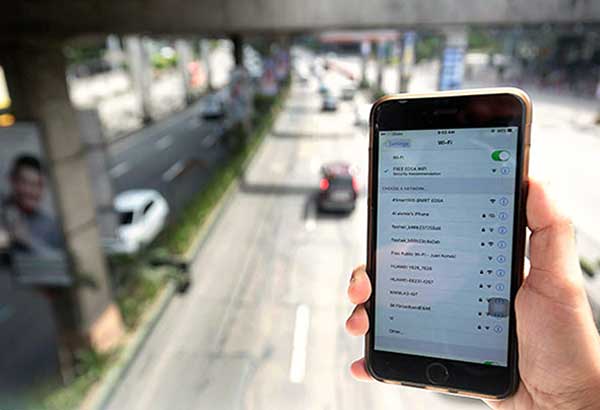Faster internet, free WiFi among top tech priorities

A commuter shows off his smartphone’s free wifi connection at an MRT-3 station along EDSA.
MANILA, Philippines - Faster internet speed and free WiFi in public places were among the promises made by President Duterte in his first State of the Nation Address (SONA) last year.
A year after Duterte ordered the development of a National Broadband Plan (NBP) to accelerate the deployment of fiber optic cables and technologies to improve internet speed and provide WiFi, the Department of Information and Communications Technology (DICT) has identified the nationwide internet access and free WiFi as priority projects.
DICT undersecretary Denis Villorente said the department is now preparing to conduct a feasibility study for the implementation of the NBP.
Approved by the President last March, the NBP serves as the blueprint for broadband infrastructure to interconnect government offices in the country, as well as to enable internet access of individuals in areas currently not served by telcos.
Amid increasing reliance by individuals on the internet, the government wants to see faster speeds and greater access particularly in the countryside.
Following the approval of the NBP, Villorente said the department needs to conduct a feasibility study to provide details to the blueprint.
For the feasibility study, the DICT is planning to tap the services of a third party firm.
Villorente said the DICT is coming up with the terms of reference for the selection process of the third party firm for the feasibility study.
While the DICT is coming up with the terms of reference, it is also exploring the possibility of getting assistance from the US or Japan for the conduct of the feasibility study.
“In parallel, we are trying to see how we can accelerate the formulation of the feasibility study by talking to other potential sponsors to do the feasibility study,” he said.
The DICT wants the selection process for the third party to take place within the current quarter and for the feasibility study to start within the year.
Through the feasibility study, the DICT would be able to determine how to implement the NBP, as well as the amount of investment required.
“The cost will come out from the feasibility study,” Villorente said.
The DICT made an initial estimate of P77.9 billion in investment which will be needed to implement the NBP.
Villorente, however, said the amount may be reduced if the government would utilize fiber assets which are already in place.
He said the National Grid Corp. of the Philippines (NGCP), for instance, has expressed willingness to allow the government to use the existing fiber optics network in the transmission grid for the implementation of the NBP.
DICT Secretary Rodolfo Salalima said the department is in talks with the NGCP on the use of the fiber optics network.
“We have received the draft memorandum of understanding so, if we agree to use fiber optic of NGCP, we can already sign,” he said.
Salalima said he wants the memorandum to be signed within the year.
NGCP president and chief executive officer Henry Sy Jr. has said the grid operator would want to support the government’s NBP.
Apart from the NBP, the DICT has also identified Pipol Konek, which involves the rollout of free WiFi in public places, as another priority project.
In line with the directive to provide free internet access in public places, telcos Smart Communications Inc. and Globe Telecom Inc. launched with the DICT last June 12 the EDSA WiFi project which makes high-speed internet connectivity available throughout the 24-kilometer stretch of the main thoroughfare.
The EDSA WiFi project also includes all the stations of the Metro Rail Transit Line 3 which spans Taft Ave. in Pasay City to North Ave. in Quezon City.
With Smart and Globe providing free WiFi, Salalima said commuters could choose which connection would best serve their needs.
“We welcome the cooperation of the private sector on this endeavor as we aim to give people choices,” he said.
Smart’s move to deploy WiFi along EDSA is in line with ongoing efforts to deliver improved services through the rollout of Long Term Evolution (LTE) sites, as well as by enabling cell sites to handle greater volume of calls, texts and mobile data traffic.
“We at PLDT and Smart are happy to support this DICT initiative which will benefit the public immensely. This is in line with our firm commitment to build cutting-edge digital infrastructure that will help power the country’s development and enrich the lives of our people,” PLDT Inc. and Smart chairman and chief executive officer Manuel V. Pangilinan said.
Globe’s participation in the EDSA WiFi project is also aligned with the telco’s commitment to improve the state of internet in the country.
“We are supporting the efforts of the government who is tapping our Go WiFi facilities for the EDSA WiFi project to achieve the same goal of one digital nation,” Globe president and chief executive officer Ernest Cu said.
Last year, Duterte also told telcos to shape up and improve services or he would open the industry to foreign players, given complaints of consumers of poor service.
Telcos have vowed to provide better internet services and continue to make investments for deployment of cell sites and fiber facilities.
PLDT has set its capital expenditure guidance at P46 billion for this year to further expand the network infrastructure.
The group is aiming to increase LTE coverage to 785 municipalities by the end of the year.
Smart targets to roll out 2,165 sites with LTE in low spectrum bands and 3,568 sites in high spectrum bands this year, Joachim Horn, chief technology and information advisor for PLDT and Smart said.
The PLDT group is also investing in the deployment of fiber-to-the-home (FTTH) facilities to provide world-class internet to households.
- Latest
- Trending


























